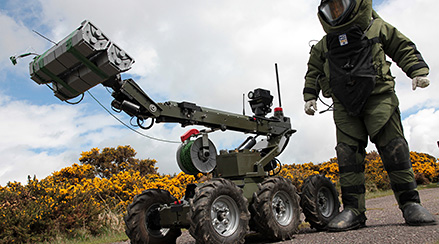Homemade bombs are threats that are not going to go away, and ever closer civil-military cooperation is needed to neutralise them, as EDA Capability, Armament and Technology Director Pete Round explains in this opinion piece originally published by Security Europe.
Improvised explosive devices remain the single largest killer of coalition soldiers in the war in Afghanistan – and a favoured weapon of Europe’s home-grown terrorists as well. This has put the devices at the forefront of public debate, with the acronym ‘IED’ now used and widely understood well beyond just military circles.
However, even if they have gained a lot of public attention in the last few years, IEDs are nothing new. With their low cost and ability to cause significant damage they have been the weapon of choice for insurgents fighting technologically superior forces for decades.

|
| Counter-IED training © EDA |
Biggest threat
With this asymmetric warfare likely to remain the norm, IEDs will continue to be the biggest single threat to our soldiers on the ground – as well as being a growing threat to civilian populations. It is vital that the experience and knowledge gained in fighting IEDs in Afghanistan is not lost. Moreover, we need to ensure the best possible collaboration between military and civilian law enforcement entities.
The European Defence Agency (EDA) has played an important role in ensuring that skills and knowledge in tackling IEDs are maintained. One important element of its counter-IED work is technical exploitation. This refers to the recording and analysing of information related to events, scenes, technical components and the materials used in an IED attack.
The objective of counter-IED exploitation is to gather the technical and tactical data about the attack whilst at the same time identifying the IED “supply chain” in order to gather intelligence about those involved in IED production and use. Exploitation allows bomb disposal experts to better understand the threat they are dealing with, helping them to predict future activity and allowing them to attack the network involved in producing the devices. A number of the EU’s civil security research projects financed by the European Commission aim for similar goals, for example.
Counter-IED exploitation was the rationale behind the 2011-2014 deployment of a multi-national theatre exploitation laboratory in Afghanistan, where it helped disrupt networks making and using IEDs. In parallel to that effort, a new programme, called the “Joint Deployable Exploitation and Analysis Laboratory” (JDEAL) was begun in May 2013. Under Dutch lead, its aim was to establish a permanent IED exploitation training facility in the Netherlands, staffed by a permanent multinational team. Under the project, a further two deployable laboratories could be procured for use in future operations.
Pooling and sharing
Initiatives such as JDEAL aim to ensure that the knowledge gained at a considerable price in wartime is not lost to other defence actors, but also made available to the bomb disposal community as a whole, whether military or civil. Indeed, IEDs are not only a threat to our soldiers overseas: for decades, they have also been used against civilians in Europe often with lethal results. They will continue as the weapon of choice for individuals planning terror attacks against Europe’s homeland.
In order to ensure an efficient “spillover” of know-how between these two interconnected worlds, dedicated events have recently been jointly organised by the EDA and Europol. These have brought together experts from as many as 16 different European countries.
The overarching idea is really quite simple: participants take part in realistic training scenarios that involve homemade explosives based on situations experienced in the real world. By doing so, they share best practices and improve their skills through multinational and civil-military cooperation. Even the United States has showed interest in the initiative by sending experts from the FBI and US Department of Justice.
Winning the IED war
This combined approach ought to be extended to the whole spectrum of C-IED activities – and not just for the disposal of homemade explosives. Other critical skills, such as exploitation techniques currently tackled via the JDEAL project, are needed to win the IED war.
If we want to effectively predict and prevent further IED-related incidents on the battlefield or the homeland – and develop the means to safely neutralise them in a variety of conditions – then we need to push this civil-military cooperation as far as we can. The lives of European soldiers and citizens might very well depend on it.
More information